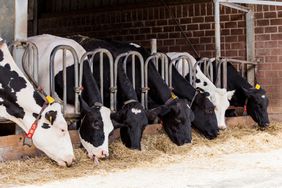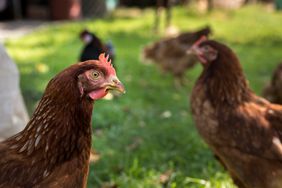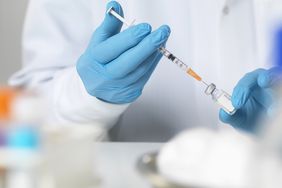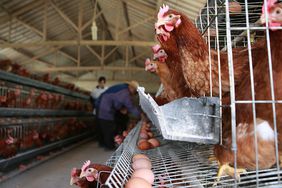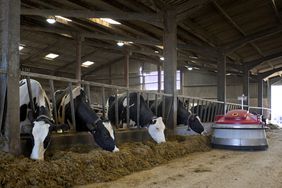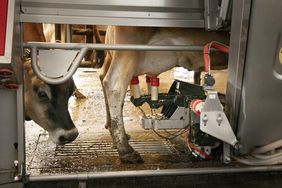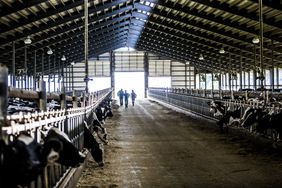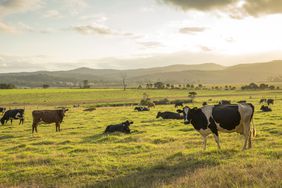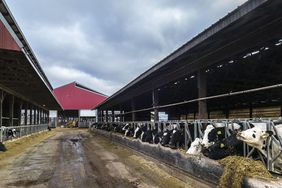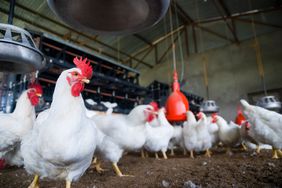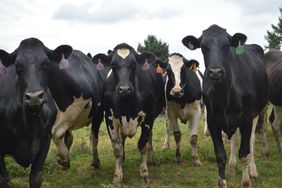:max_bytes(150000):strip_icc()/cows-dairy-cows-milk-food-162801-cf2ceaba4bac41e7b51bbf2c9ada34f0.jpeg)
Pixabay / Pexels
By Lindsey Toomer
State officials say the public risk of contracting avian influenza remains low after a farm worker in northeastern Colorado became the fourth diagnosed human case in the country last week.
The case, the state’s first this year related to the spread of the H5N1 strain of highly pathogenic avian influenza, also known as bird flu, from dairy cattle to humans, was reported after an adult man working on a farm in the northeast region of the state experienced pink eye. He has since recovered.
In the last 30 days, Colorado cattle have accounted for just under 48% of confirmed cases in the country, according to data from the U.S. Department of Agriculture. In total, 27 herds in Colorado have a confirmed case. That’s the second-most in the country. Twenty-three of those cases were reported in the last month.
Olga Robak, spokesperson for the Colorado Department of Agriculture, said the state has 105 licensed dairy herds and about 200,000 dairy cows. One farm has closed since the start of the outbreak, though the closure was not related to avian flu.
“CDA has been conducting active outreach to Colorado’s dairy industry to emphasize the importance of monitoring cattle for symptoms, reporting any potential clinical signs of HPAI, and stopping movement of cattle to prevent virus spread,” Robak said in a statement. “Our educational approach helps producers understand the importance of reporting symptoms, isolating sick animals, and continuing strong biosecurity practices.”
Sasha Geffen, spokesperson for the Colorado Department of Public Health and Environment’s Division of Disease Control and Public Health Response, said people who are in regular contact with infected animals are at the highest risk of contracting the virus.
Geffen said the general public should avoid contact with sick birds or other animals, and if one must interact they should wear personal protective equipment including gloves, eye protection and N95 respirators.
People should drink pasteurized milk, as the process eliminates potentially harmful bacteria and viruses. It is also safe to consume properly handled and thoroughly cooked beef and poultry, Geffen added.
Colorado Gov. Jared Polis verbally declared a disaster emergency Friday, particularly to support a commercial poultry facility in Weld County that experienced an outbreak. The declaration allows the Office of Emergency Management to take necessary measures to help with response, recovery and mitigation.
The last time someone in Colorado was diagnosed with bird flu was in 2022, which came as a result of infected poultry.
The other three human cases reported this year include two dairy farm workers in Michigan and one in Texas. Two of the cases resulted in pink eye, while one of the Michigan patients experienced mild respiratory symptoms.
More than 97 million poultry throughout 48 states have tested positive for H5N1 since the outbreak began in January 2022, according to reports from the Centers for Disease Control and Prevention.
Anyone working with dairy cows who starts to feel sick or suspects they might have avian flu can call CDPHE at 303-692-2700 (or 303-370-9395 after normal business hours) to get a flu test and medicine if needed.
Colorado Newsline is part of the States Newsroom, a network of similar news bureaus supported by grants and a coalition of donors as a 501c(3) public charity.
